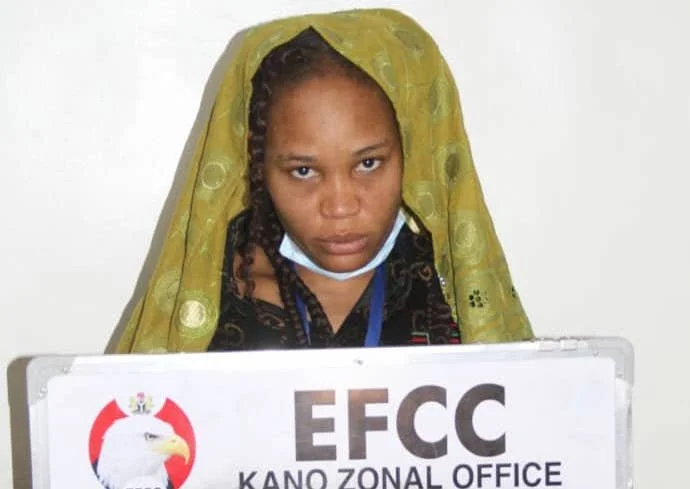EFCC Arrests Popular TikTok Star Murja Ibrahim Kunya for Naira Mutilation – Is This The End of Flashy Social Media Culture?
The Economic and Financial Crimes Commission (EFCC) has taken its crackdown on financial misconduct to a new level by arresting popular TikTok star, Murja Ibrahim Kunya, in Kano State. The social media influencer was apprehended on charges of Naira mutilation and abuse, particularly for her role in spraying money during various social events, which is a clear violation of Nigerian law.
According to Freedom Radio Kano, a source within the EFCC confirmed that Murja is currently in custody, with investigations ongoing. This latest development adds her name to the growing list of social media influencers and celebrities falling into the commission’s net for similar violations.
A Bold Move Against Indecent Display of Wealth
The EFCC’s intensified operations target individuals who engage in indiscriminate spraying of money at lavish events like parties and birthday celebrations. Interestingly, Murja Ibrahim Kunya is not the first influencer to be caught up in this web. Others, including Al’amin G-Fresh and Ashir Idris, were also recently detained on similar charges.
The issue of Naira abuse has become a hot topic in Nigeria, with many arguing that such acts contribute to the devaluation of the nation’s currency and promote a culture of reckless opulence. But at what point does enforcement cross the line into the realm of social control?
Where Do We Draw The Line?
While the EFCC’s actions are indeed rooted in the law, some believe the crackdown might be drifting into a clash between cultural norms and regulatory enforcement. After all, the tradition of spraying money at celebrations is something that has been a part of Nigerian social life for decades. But with influencers like Murja Ibrahim Kunya now making these acts more visible to the public via social media, it’s clear that authorities are determined to send a powerful message.
Opinion: Is The EFCC’s Clampdown Justified?
One cannot deny the fact that the EFCC’s actions are legally justified. However, this recent development raises the question of whether the commission is merely reacting to the growing social media culture of flaunting wealth, which has become rampant among influencers and celebrities.
Should the EFCC focus on more pressing financial crimes, or is this crackdown essential to protect the dignity of the Naira?
Furthermore, Murja Ibrahim Kunya’s arrest highlights the shifting dynamics of modern Nigerian culture. Young influencers are often trapped between maintaining their social media fame and staying within the confines of the law.
A Wake-Up Call or Just a Trendy Scandal?
If nothing else, this situation serves as a wake-up call for influencers to be mindful of how their online actions could have legal consequences. It also brings to light the need for greater public awareness and education about what constitutes Naira abuse.
As of now, neither the EFCC nor Murja’s legal representatives have released an official statement. But one thing is clear—this case is likely to fuel heated debates about the evolving relationship between social media fame and legal accountability in Nigeria.
What do you think? Is the EFCC’s crackdown a necessary step to protect the Naira, or is it an overreach into cultural practices?








